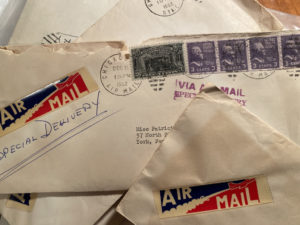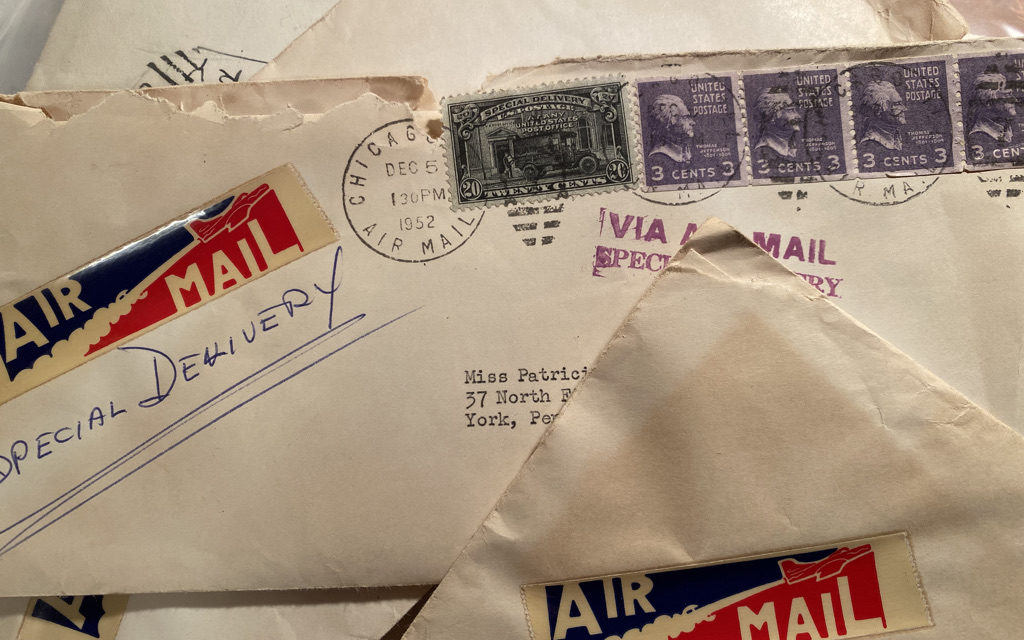Recently my sister shared with me a stack of letters sealed in a plastic zip-locked bag she had found amongst my mom’s possessions. They were love letters from my father written around 1952 in the year before they were married. She lived in New York, and he lived in Chicago so letter writing at the time is what folks did. At first, I thought I should not read these most private of communications between my parents, both deceased, but after diving into a couple I changed my mind as they were amongst the most beautifully written, romantic letters I have ever read – and I secretly hoped my mother had kept them all through the years in hopes that one day they might be discovered by her children as a way of seeing our father in a new light. As I read the letters, I couldn’t help thinking I wish I would have listened more to my dad when he was still with us.
Simultaneous with this discovery, I started reading It is a fascinating read that leapfrogs past many of our preconceived ideas about what makes a good listener.
It is a fascinating read that leapfrogs past many of our preconceived ideas about what makes a good listener.
Ms. Murphy talks about what she calls “closeness-communication bias” https://tinyurl.com/yejcw96t. This is what often happens to people in long-term relationships. They tend to lose their curiosity for one another. We become convinced we know the other person better than they know themselves. That’s when we find ourselves saying things like: “You don’t even know me” or “I know what you are going to say so don’t bother….” At a certain point, we stop listening, are no longer curious, and base our present-day assumptions about a person on the past – forgetting that they have evolved through the years just as you have.
One remedy for this dilemma is to remember that “active listening” – coined originally by Psychologist Carl Rogers – is listening more for the underlying emotion of the communicator rather than just the surface level details. Rogers described himself while active listening this way: “I hear the words, the thoughts, the feeling tones, the personal meaning, even the meaning that is below the conscious intent of the speaker.” Murphy shares at one point, “When someone says something to you, it’s as if they are tossing you a ball. Not listening or half listening is like keeping your arms pinned to your sides or looking away so the ball sails right past or bounces clumsily off you.”
How does this all relate back to my father’s love letters to my mother? It makes me wish I could go back in time and truly listen to his tales of courting my mom. Yes, I have great insight now through his letters but wonder what new kinds of conversations we might have had during the years I experienced him as a busy professional pre-occupied with all the stresses and responsibilities of managing a career and taking care of his family. At the time, I may have stopped listening assuming I knew who he was and what mattered to him. His letters reveal a side of him I did not know.
We live in a world today where our lives are driven by technology that offers us endless ways to connect, and yet we often feel more isolated and lonelier than ever before. The good news is, we do have the opportunity with every interaction to listen and learn something new. As Murphy says, “We learn when we listen. It’s how we connect, cooperate, empathize, and fall is love. While we might take listening for granted, how well we listen, to whom, and under what circumstances determines who we are and the path we take in life.”
Pay attention this week to your listening opportunities with friends, family, and colleagues you know so well. Can you learn something new? Be curious.







